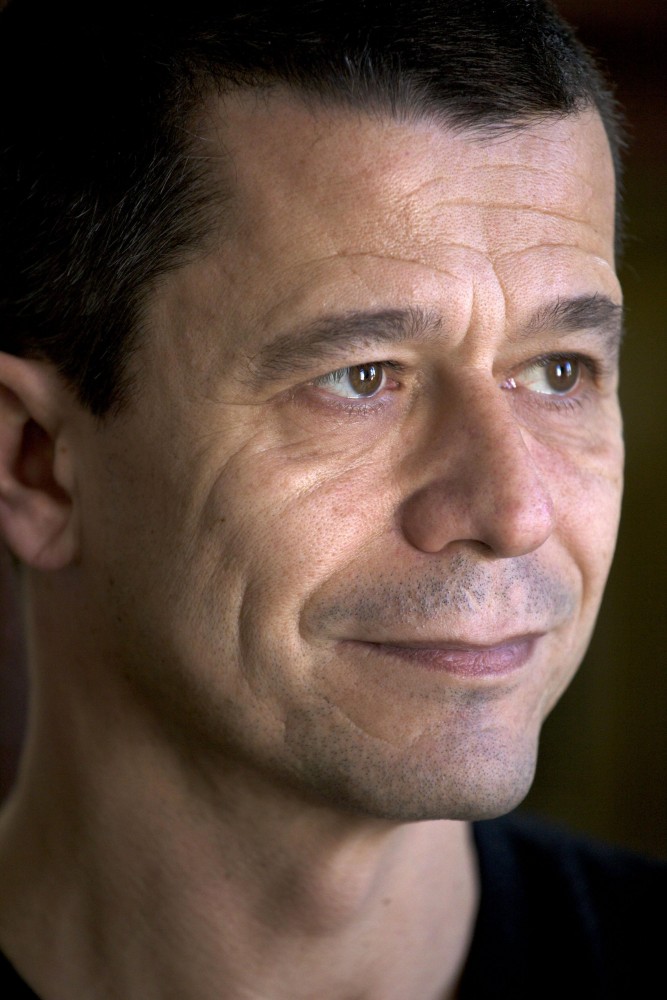Emmanuel Carrère

Over the past quarter of a century, literary critics have compared French author Emmanuel Carrère to writers from Stephen King to Truman Capote, but these days his books seem to defy all classification. The same might be said of his work as a filmmaker, screenwriter, journalist and biographer—in short, Carrère takes his audiences by surprise with every new twist and turn of his multifaceted career.
“What I write is close to what Truman Capote called nonfiction novels,” he explains. “They’re based on aspects of reality that I narrate in the first person, and my autobiographical presence varies according to each book. I tend to use all the tricks of the trade in fiction writing but the stories are also deeply personal…and true.”
Awarded the prestigious Renaudot Prize in 2011 for his latest bestselling work, Limonov (slated for release in English in September 2013), Carrère describes the book as a mash-up of memoir, reportage and a slightly romanticized version of the life of Eduard Limonov, a Russian writer, adventurer and politician.
Grave to mischievous
“I knew Limonov in the 1980s in Paris when he was a trendy author and a bit rock-and-roll,” Carrère recounts. “I really liked his autobiographical books about all his scandalous adventures. Plus, he was different than all the serious Russian dissidents we’d seen. To me, he seemed like a kind of Jack London or Henry Miller, though not quite as important.”
Sitting in the living room of his sprawling, homey apartment on a quiet residential street in Paris’s 10th arrondissement, sipping tea, the 54-year-old Carrère seems younger than his years and radiates a palpable intensity. Lean and energetic, he has a rich, vibrant voice, an engaging manner and a ready smile. His manner alternates between grave and mischievous, much like his alter-ego narrator.
“When I went to interview Limonov in Moscow five years ago, I spent two weeks with him,” Carrère continues. “To be honest, I came out of that without knowing what I really thought of him—whether I even liked him or not. For example, Limonov went to fight in Eastern Europe with the Serbian troops and created a bizarre neo-Fascist party. I was totally bewildered—it was like finding out that your old high school friend had become a figure of organized crime.”
“Ultimately, I realized that his story presented the possibility of writing a picaresque novel that coincides with a story that traces the fall of communism.”
Two Juliettes
Born in Paris, the grandson of a Russian émigré, Carrère studied political science at the Institut d’Etudes Politiques de Paris, wrote his first novel, L’Amie du Jaguar, in 1983, and began working as a journalist and cinema critic. His mother, Hélène Carrère d’Encausse, is a high-profile historian in Russian affairs, and a distinguished member of the Académie Française, the first woman elected as its Secrétaire Perpétuel.
Carrère now speaks fluent Russian, but he says that in his early years he avoided his Russian heritage for personal reasons, later explored in his 2007 novel, Un Roman Russe (My Life as a Russian Novel).
While writing Limonov Carrère was simultaneously working on a completely different kind of intertwined fiction-meets-reality story entitled D’Autres Vies Que la Mienne (Lives Other Than My Own), published in 2009. The “plot” revolves around the death, only months apart, of two beloved Juliettes: one is an adorable four-year-old child, cruelly swept away by a tsunami; the other is his girlfriend Hélène’s younger sister, who is a judge and mother of three who can no longer fight her terminal cancer. After the death of the older Juliette, a new inspirational figure emerges—Etienne, also a judge and cancer victim, who has lost a leg to the disease. The last third of the book explores Etienne’s moving account of Juliette’s strengths.
This may sound bleak, but Carrère’s masterful storytelling and scalpel-sharp prose weave together the tenuous threads of fate that link happiness with misfortune, turning the theme of love and loss into a riveting page-turner. As in his other recent books, the author/narrator zigzags between facts and autobiographical perceptions.
The novel begins with the following confession: “The night before the wave, I remember that Hélène and I talked about separating. It wouldn’t be complicated; we didn’t live together, hadn’t had a child, and were even able to see ourselves remaining friends, yet it was sad.” It’s December 2004. Carrère and his girlfriend are on vacation in Sri Lanka with their respective sons in tow. By fluke, on the catastrophic morning of the tsunami, they decide to skip the beach and relax at their clifftop hotel, unaware of the horror and devastating chaos below that would wipe out thousands of lives. Later, grappling with feelings of helplessness and guilt, the narrator is particularly affected by the dramatic loss of a young couple, also at the hotel, whose child, Juliette, was playing in the sand when the wave hit.
Mysterious mustache
“This is the one book that came to me without a conscious or deliberate decision,” says Carrère. “It gradually took form as things happened. And once I got to know Etienne, after Juliette’s death, I actually felt like I’d been given a kind of order to write these two stories.”
To date, he says, Lives Other Than My Own is his favorite among his own books, since it touches on issues that are more universal than those in his other works. Not only did the experience turn him into a more compassionate man, he says, but it forced him to explore his own difficulty with love and commitment. “I’m writing books that are less…neurotic,” Carrère muses with a smile, “or at least I hope so.”
Having translated Carrère’s early books into English at the outset of his career, I’m inclined to agree. When his best-selling novel The Mustache was published in English in 1988, Carrère was literally unknown in the United States and Britain. (Today he is among the handful of contemporary French authors, such as Michel Houellebecq and Philippe Djian, whose works are systematically translated for English publication.)
In those early days, his dark fiction was steeped in a chilling metaphysical angst that smacked of Kafka or even Gogol. The Mustache is indeed the hair-raising tale of a nameless young Frenchman who, while sitting in a bath, decides to shave off his mustache, and asks his wife, Agnès, if she thinks it would be a good idea. Yet strangely, once the deed is done, she doesn’t notice the change, nor do his friends or co-workers, for that matter, until the infuriated protagonist finally confronts his wife, only to be told that he has never had a mustache. The ensuing drama—has the whole world gone mad or has he?—drives him to escape to Hong Kong where he spends his days taking the ferry back and forth to Kowloon, until the climax arrives in a grisly ending.
True shocker
By the same token, his 1984 romanticized biography of the convoluted friendship between the Shelleys and Lord Byron, Bravoure (Gothic Romance), and the more factual 1993 life story of visionary American sci-fi writer Philip K. Dick, entitled Je Suis Vivant et Vous Etes Mort: Philip K. Dick, 1928–1982 (I’m Alive and You Are Dead: A Journey into the Mind of Philip K. Dick) also share many common themes about death and loss.
In 2000, with his bestselling shocker, L’Adversaire (The Adversary) Carrère says he embarked on new territory, recounting the true-life story of a criminal who is still in prison. “On the Saturday morning of January 9, 1993, while Jean-Claude Romand was killing his wife and children, I was with mine in a parent-teacher meeting…” is the opening line.
In fact, says Carrère, “It was by looking in my agenda to see what I was doing the day that Romand killed his entire family that I was able to begin.” He sinks back into the sofa and pauses. “It’s been 15 years since I wrote the opening sentences of The Adversary and they’ve become a kind of musical note that I’ve gradually developed in my other books.”
Since that time, Carrère has pocketed a plethora of literary prizes including the 1995 Prix Femina for La Classe de Neige (Class Trip). The novel was later adapted for screen by the late director Claude Miller—Carrère co-wrote the screenplay—and the film won the Jury Prize at the Cannes Festival in 1998.
Page to screen
Carrère is still actively involved in cinema in one way or another. As director and screenwriter, his first feature-length film, the documentary Retour à Kotelnitch (Return to Kotelnitch)—a convoluted quest for the facts about his Russian grandfather’s roots—was warmly received at the 2003 Venice Film Festival, and his screen adaptation of his own La Moustache, which he also directed, won the Label Europa Cinemas Prize in 2005.
In 2010, Carrère was on the jury presided over by Tim Burton at the Cannes Festival, and in May he will be back in Cannes, joining with Belgian filmmaker Jean-Pierre Dardenne, as a member of the jury for the Cinéfondation and short films.
Does he ever entertain the idea of going back to writing what might be called “pure” fiction? “I don’t think the novel is dead, nor do I have any ideological position against fiction,” he says with a grin. “Maybe someday…but not for now.” He pauses, momentarily distracted by his five-year- old daughter, Jeanne, squealing with laughter in the next room. Her mother, of course, is Hélène—they have remained together ever since the day in Sri Lanka when they didn’t decide to separate.
Lives Other Than My Own was published in September 2011 by Metropolitan Books. The English translation of Limonov is slated for release in fall 2013, published by Farrar, Strauss & Giroux.
Originally published in the May 2012 issue of France Today
Share to: Facebook Twitter LinkedIn Email
Leave a reply
Your email address will not be published. Required fields are marked *



